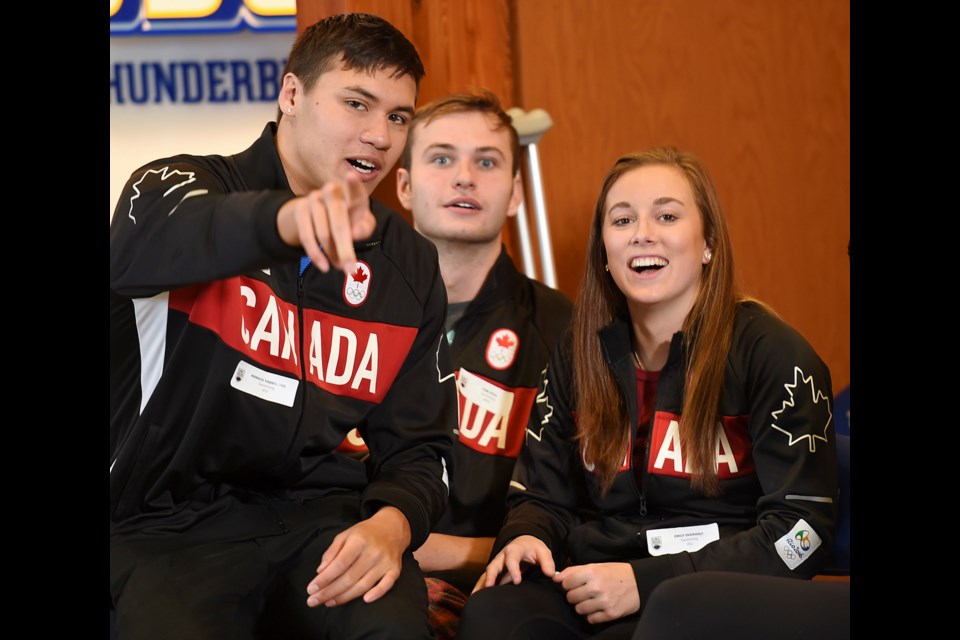For someone who’s spent the better part of a decade in the pool, it shouldn’t come as a surprise that Emily Overholt appears to have ice water in her veins.
At just 18 years old, the Â鶹´«Ă˝Ół»resident isn’t letting the weight of the world consume her ahead of what will be her biggest competitive moment next month when she takes to the pool at the Summer Olympics in Rio.
Instead, the accomplished swimmer likens the pressure to water running off a duck’s back.
“I’m not usually one to get nervous — I get really excited and I’m usually fairly clam before a race,” said Overholt, who’ll compete in both the 400-metre individual medley and 400-metre freestyle events in Rio. “If I ever do get any kind of nerves, I try to use them to my advantage and use that excitement to my benefit. Swimming is super repetitive; I’ve done this thousands of times before. I look at it like it’s just one race, it’s just one swim meet.”
Overholt spoke to the Courier Wednesday at UBC’s Doug Mitchell Thunderbird Sports Centre, a fitting Olympic precursor given the site played host to hockey and sledge hockey events during the 2010 Winter Games.
At that time, Overholt was still a pre-teen and years off of the Team Canada radar. Fast forward to 2014 and the West Â鶹´«Ă˝Ół»native began her competitive pool pursuits for the red and white: she punched her ticket to Rio in April 2016, after finishing second in the 400 IM and besting the required time standards.Ěý
“When I touched the wall, I knew I was going, which was super exciting,” she recalled. “It didn’t really sink for a quite a while after that. When I saw my family that night, it was very special for me.”
Wednesday’s event was attended by UBC alumni, dignitaries, athletes and staff, and featured equal parts celebration, send-off and pep rally. While wishes of good luck were in the air, the send-off also served as a chance to prod out some proverbial UBC pride: 29 current and former T-Birds are slated to take part in the Games, along with another 17 coaches, management, support staff and medical and paramedical personnel. Those numbers represent the largest contingent of athletes headed to the Games from any Canadian university.Ěý
Having flown in from the U.S. specifically for the event, UBC president designate Santa Ono offered up a token of good fortune to each athlete and coach in attendance: a blue bow tie fashioned in UBC colours.
“Just getting a chance to compete on the world stage is a tremendous achievement,” said Ono, who characterized the T-Birds team as one of the “finest athletic programs in the world.”
Like Overholt, Gordon Johnston is also making his Olympic debut next month. A fourth-year defender/midfielder with UBC’s field hockey team, Johnston wants his national side to announce to the world that it can hang with the big dogs on the world stage.
“We are looking for a quarterfinal berth. That’s our original goal,” said Johnston, whose Canadian team is currently ranked 15th internationally. “Once you get there, all the rankings go outthe window and you’ve got your eyes on a medal. At that point we’re looking for a medal.”
The Canadian club earned its spot in Rio in late June, after stunning a pair of higher seeded sides — Spain and New Zealand — at the World League Semifinals in Argentina.
“After what we accomplished in Argentina, that gave us a lot of confidence,” said the 23-year-old applied sciences student. “I really hope we’re going to play some competitive games and get some results in Brazil. Representing your country at the highest level is always an honour.” Ěý
Byron Green’s time to shine in sun-soaked Brazil comes slightly after that of his T-Bird contemporaries. The wheelchair rugby player will lead his No. 1-ranked Canadian side into action in mid-September, with qualifying matches to be played Sept. 14 to 16.
“This being my first Paralympic games, I definitely want to enjoy the experience. But at the same time we’re headed down there with our eyes on gold,” Green said. “That’s our goal and our mindset.” Ěý
Green’s team has been doing just that as of late, as the Canadians rattled off first-place finishes at both the Parapan American Games and the World Rugby Challenge in 2015. A year earlier, the Canucks placed second at both the World Championships and Canada Cup International Wheelchair Rugby Tournament.Ěý
The Comox native’s sport of choice is derived largely from murderball and is played on a basketball court. It shares similarities with traditional rugby in that the end goal is to cross the opponent’s goal line for a point.Ěý
Two wheels must cross the goal line in order for a goal to count, and games consist of four eight-minute quarters.
And like in rugby, full contact is both expected and encouraged.
“I want to get down there and take care of business,” Green said.
The Summer Olympics run from Aug. 5 to 21, while the Paralympics are scheduled from Sept. 7 to 18.
Ěý
Ěý
Ěý



